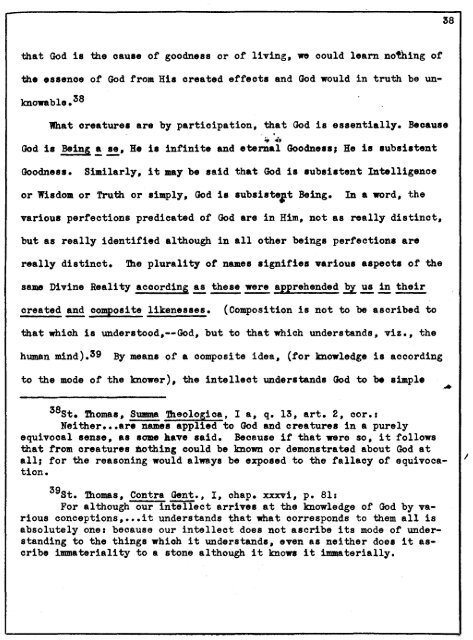Natural Knowledge of God in the Philosophy of Saint Thomas Aquina
You also want an ePaper? Increase the reach of your titles
YUMPU automatically turns print PDFs into web optimized ePapers that Google loves.
SS<br />
that <strong>God</strong> is <strong>the</strong> cause <strong>of</strong> goodness or <strong>of</strong> liv<strong>in</strong>g, we could learn noth<strong>in</strong>g <strong>of</strong><br />
<strong>the</strong> essenoe <strong>of</strong> <strong>God</strong> from His created effects and <strong>God</strong> would <strong>in</strong> truth be unknowable.<br />
SS<br />
. ...,<br />
What creature. are by participation, that <strong>God</strong> is essentially. Because<br />
<strong>God</strong> is Be<strong>in</strong>g.!!!, He is <strong>in</strong>f<strong>in</strong>ite and eternal Goodneu; He is subsistent<br />
Goodness.<br />
Similarly, it may be said that <strong>God</strong> is subsistent Intelligence<br />
or Wisdom or Truth or simply, <strong>God</strong> is subsistelt Be<strong>in</strong>g.<br />
In a word, <strong>the</strong><br />
various perfections predicated <strong>of</strong> <strong>God</strong> are <strong>in</strong> Him, not as really dist<strong>in</strong>ct,<br />
but as really identified although <strong>in</strong> *11 o<strong>the</strong>r be<strong>in</strong>gs perfections are<br />
really dist<strong>in</strong>ct. <strong>the</strong> plurality ot names signifies various aspects <strong>of</strong> <strong>the</strong><br />
same Div<strong>in</strong>e Reality accord<strong>in</strong>g .!! <strong>the</strong>se .!!!:!. apprehended .!?z 2! ~ <strong>the</strong>ir<br />
created ~ compod te likenesses.<br />
(Compost tion is not to be ascribed to<br />
that which is understood,--<strong>God</strong>, but to that which understands, viz., <strong>the</strong><br />
human m<strong>in</strong>d).S9 By means <strong>of</strong> a composite idea, (tor knowledge is accord<strong>in</strong>g<br />
to <strong>the</strong> mode <strong>of</strong> <strong>the</strong> knower), <strong>the</strong> <strong>in</strong>tellect understands <strong>God</strong> to be simple<br />
,,..<br />
SSSt. <strong>Thomas</strong>, Summa <strong>the</strong>ologica, I a, q. IS, art. 2, cor.:<br />
Nei<strong>the</strong>r ••• are names applied to <strong>God</strong> and creatures <strong>in</strong> a purely<br />
equivocal sense, a8 some aave said. Because if that were so, it follows<br />
that trom creatures noth<strong>in</strong>g could be known or demonstrated about <strong>God</strong> at<br />
all; for <strong>the</strong> reason<strong>in</strong>g would always be exposed to <strong>the</strong> fallacy <strong>of</strong> equivocation.<br />
I<br />
39 St. <strong>Thomas</strong>, Contra Gent., I, chap. xxxvi, p. 81:<br />
For although our <strong>in</strong>tellect arrive. at <strong>the</strong> knowledge <strong>of</strong> <strong>God</strong> by various<br />
conceptions, ••• it understands that what corresponds to <strong>the</strong>m all is<br />
absolutely one: because our <strong>in</strong>tellect does not ascribe its mode <strong>of</strong> understand<strong>in</strong>g<br />
to <strong>the</strong> th<strong>in</strong>gs which it understands, even as nei<strong>the</strong>r doe. it ascribe<br />
immateriality to a stone although it kno~ it immaterially.


















